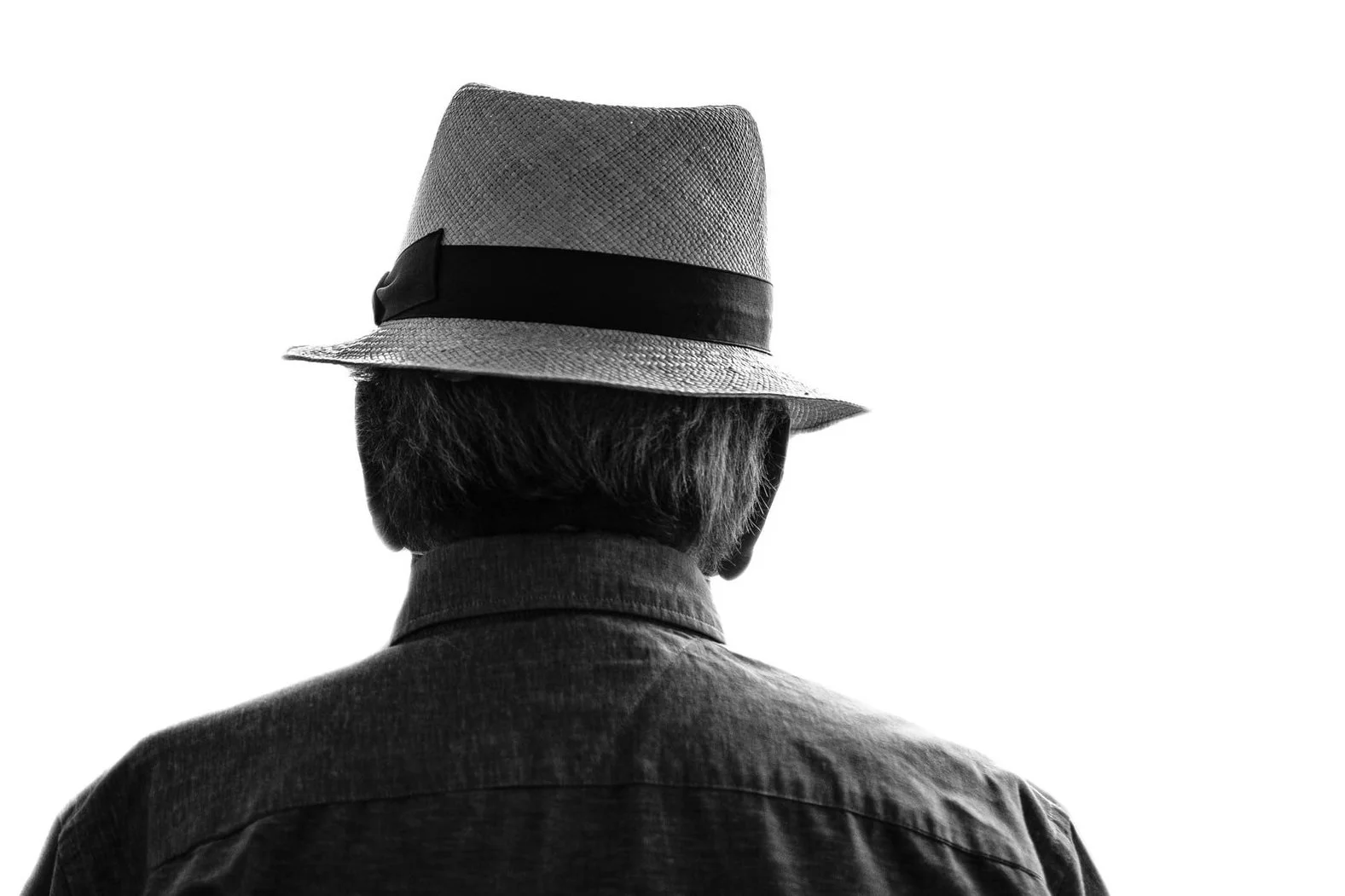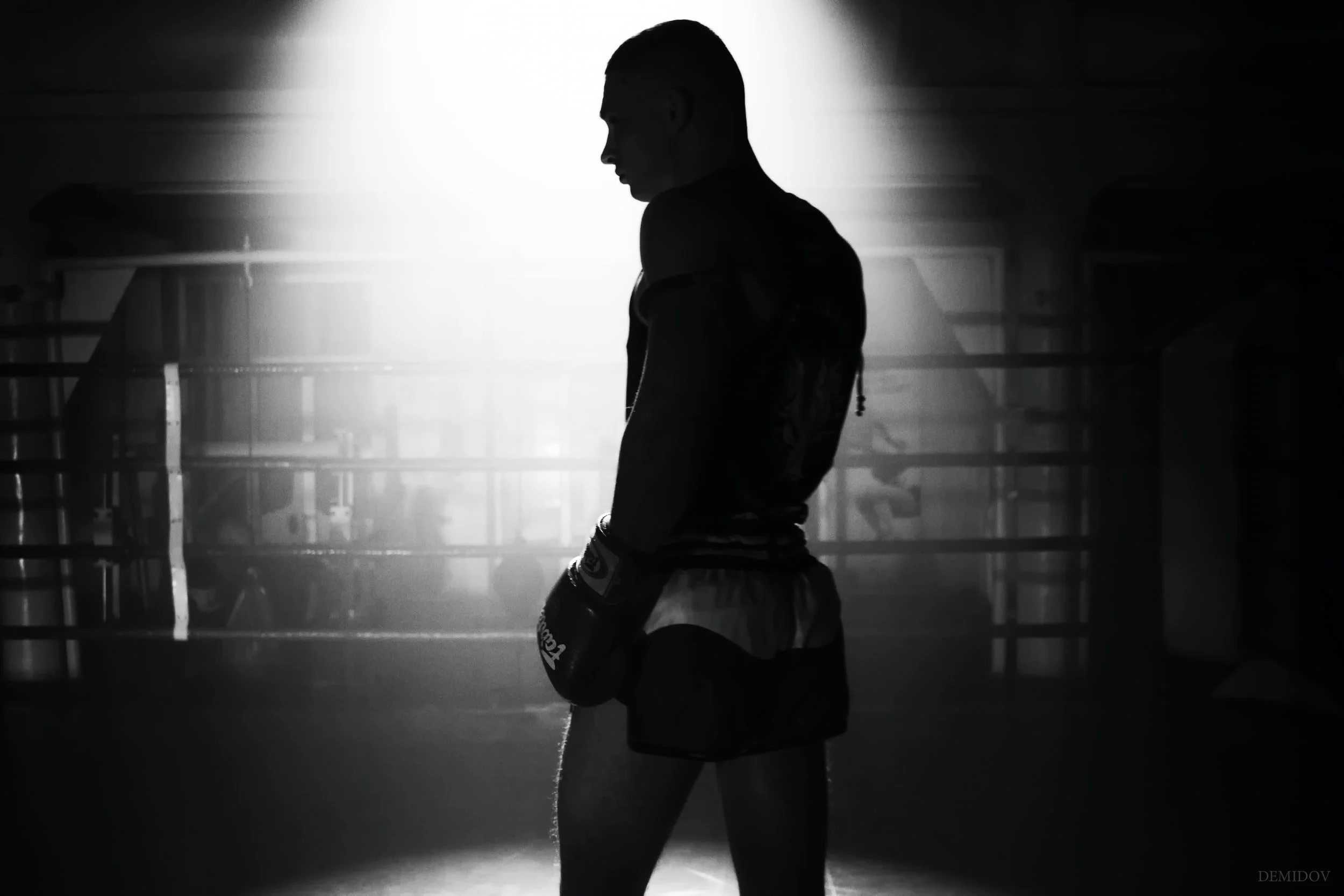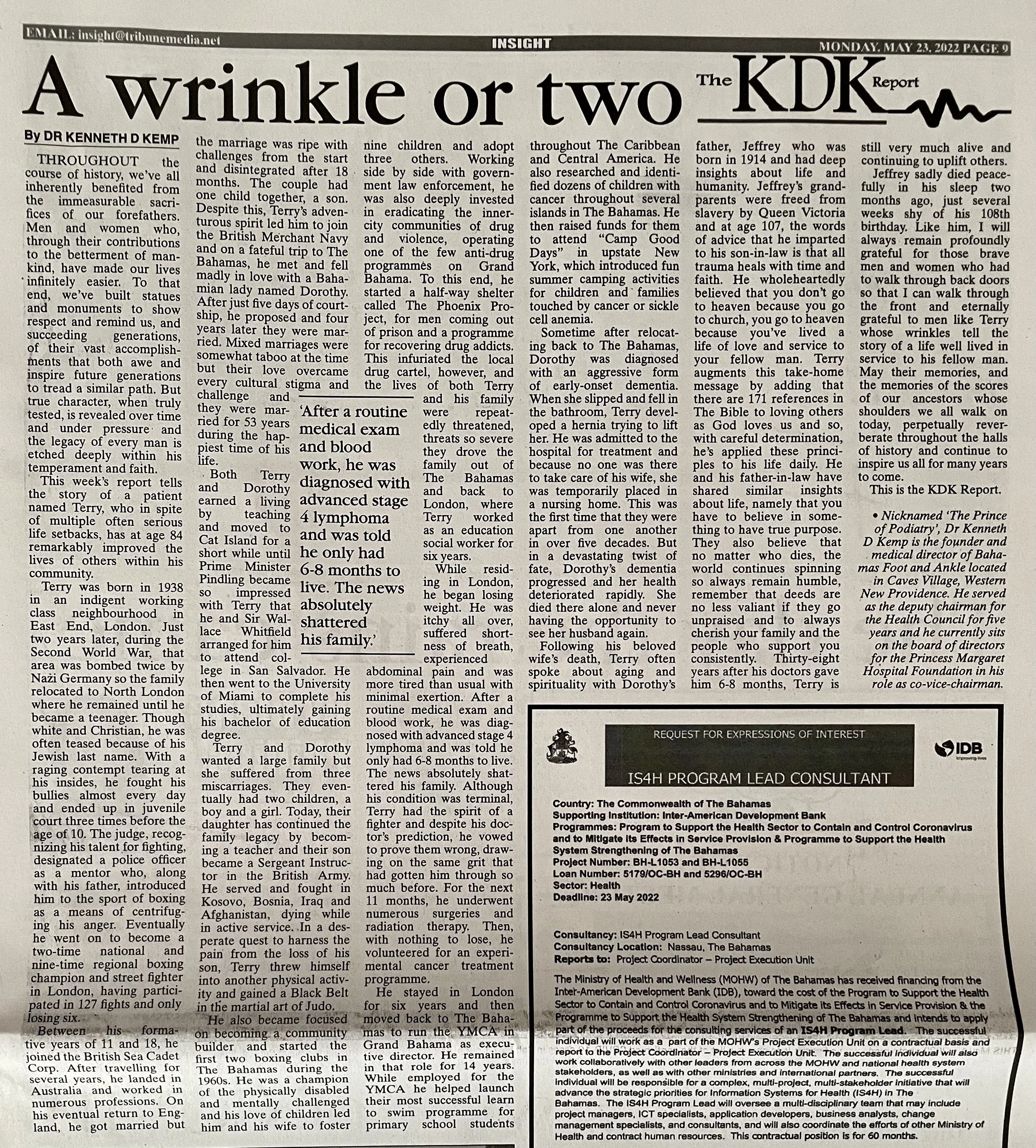Vol 35: A wrinkle or two
At some point in time, we’ve all inherently benefited from the immeasurable sacrifices of our forefathers. Men and women who, through their contributions to the betterment of mankind, have made our lives infinitely easier. To that end, we’ve built statues and monuments to show respect and remind us, and succeeding generations, of their vast accomplishments that both awe and inspire future generations to tread a similar path. But true character, when truly tested, is revealed over time and under pressure and the legacy of every man is etched deeply within his temperament and faith.
This week’s report tells the story of a patient named Terry, who in spite of multiple often serious life setbacks, has at age 84 remarkably improved the lives of others within his community.
Terry was born in 1938 in an indigent working class neighborhood in East End, London. Just two years later, during the Second World War, that area was bombed twice by Nazi Germany so the family relocated to North London where he remained, until he became a teenager. Though white and Christian, he was often teased because of his Jewish last name. With a raging contempt tearing at his insides, he fought his bullies almost every day and ended up in juvenile court three times before the age of 10.
The judge, recognizing his talent for fighting, designated a police officer as a mentor who, along with his father, introduced him to the sport of boxing as a means of centrifuging his anger. Eventually he went on to become a two-time national and nine-time regional boxing champion and street fighter in London, having participated in 127 fights and only losing six.
Between his formative years of 11 and 18, he joined the British Sea Cadet Corp. After travelling for several years, he landed in Australia and worked in numerous professions. On his eventual return to England, he got married but the marriage was ripe with challenges from the start and disintegrated after 18 months. The couple had one child together, a son.
Despite this, Terry’s adventurous spirit led him to join the British Merchant Navy and on a fateful trip to The Bahamas, he met and fell madly in love with a Bahamian lady named Dorothy. After just five days of courtship, he proposed and four years later they were married. Mixed marriages were somewhat taboo at the time but their love overcame every cultural stigma and challenge and they were married for 53 years during the happiest time of his life.
Both Terry and Dorothy earned a living by teaching and moved to Cat Island for a short while until Prime Minister Pindling became so impressed with Terry that he and Sir Wallace Whitfield arranged for him to attend college in San Salvador. He then went to the University of Miami to complete his studies, ultimately gaining his bachelor of education degree.
Terry and Dorothy wanted a large family but she suffered from three miscarriages. They eventually had two children, a boy and a girl. Today, their daughter has continued the family legacy by becoming a teacher and their son became a Sergeant Instructor in the British Army. He served and fought in Kosovo, Bosnia, Iraq and Afghanistan, but died while in active service. In a desperate quest to harness the pain from the loss of his son, Terry threw himself into another physical activity and gained a Black Belt in the martial art of Judo.
He also became focused on becoming a community builder and started the first two boxing clubs in The Bahamas during the 1960s. He was a champion of the physically disabled and mentally challenged and his love of children led him and his wife to foster nine children and adopt three others. Working side by side with government law enforcement, he was also deeply invested in eradicating the inner-city communities of drug and violence, operating one of the few anti-drug programs on Grand Bahama.
To this end, he started a half-way shelter called The Phoenix Project, for men coming out of prison and a program for recovering drug addicts. This infuriated the local drug cartel, however, and the lives of both Terry and his family were repeatedly threatened; the threats so severe they drove the family out of The Bahamas and back to London, where Terry worked as an education social worker for six years.
While residing in London, he began losing weight. He was itchy all over, suffered shortness of breath, experienced abdominal pain and was more tired than usual with minimal exertion. After a routine medical exam and blood work, he was diagnosed with advanced stage 4 lymphoma and was told he only had 6-8 months to live. The news absolutely shattered his family.
Although his condition was terminal, Terry had the spirit of a fighter and despite his doctor’s prediction, he vowed to prove them wrong, drawing on the same grit that had gotten him through so much before. For the next 11 months, he underwent numerous surgeries and radiation therapy. Then, with nothing to lose, he volunteered for an experimental cancer treatment program.
He stayed in London for six years and then moved back to The Bahamas to run the YMCA in Grand Bahama as executive director. He remained in that role for 14 years. While employed for the YMCA he helped launch their most successful learn to swim program for primary school students throughout The Caribbean and Central America. He also researched and identified dozens of children with cancer throughout several islands in The Bahamas. He then raised funds for them to attend ‘Camp Good Days’ in upstate New York, which introduced fun summer camping activities for children and families touched by cancer or sickle cell anemia.
Sometime after relocating back to The Bahamas, Dorothy was diagnosed with an aggressive form of early-onset dementia. When she slipped and fell in the bathroom, Terry developed a hernia trying to lift her. He was admitted to the hospital for treatment and because no one was there to take care of his wife, she was temporarily placed in a nursing home. This was the first time that they were apart from one another in over five decades. But in a devastating twist of fate, Dorothy’s dementia progressed and her health deteriorated rapidly. She died there alone and never having the opportunity to see her husband again.
Following his beloved wife’s death, Terry often spoke about aging and spirituality with Dorothy’s father, Jeffrey who was born in 1914 and had deep insights about life and humanity. Jeffrey’s grandparents were freed from slavery by Queen Victoria and at age 107, the words of advice that he imparted to his son-in-law is that all trauma heals with time and faith.
He wholeheartedly believed that you don’t go to heaven because you go to church, you go to heaven because you’ve lived a life of love and service to your fellow man. Terry augments this take-home message by adding that there are 171 references in The Bible to loving others as God loves us and so, with careful determination, he’s applied these principles to his life daily.
He and his father-in-law have shared similar insights about life, namely that you have to believe in something to have true purpose. They also believe that no matter who dies, the world continues spinning so always remain humble, remember that deeds are no less valiant if they go unpraised and to always cherish your family and the people who support you consistently. Thirty-eight years after his doctors gave him 6-8 months, Terry is still very much alive and continuing to uplift others.
Jeffrey sadly died peacefully in his sleep two months ago, just several weeks shy of his 108th birthday. Like him, I will always remain profoundly grateful for those brave men and women who had to walk through back doors so that I can walk through the front and eternally grateful to men like Terry whose wrinkles tell the story of a life well lived in service to his fellow man.
May their memories, and the memories of the scores of our ancestors whose shoulders we all walk on today, perpetually reverberate throughout the halls of history and continue to inspire us all for many years to come.
This is The KDK Report.





